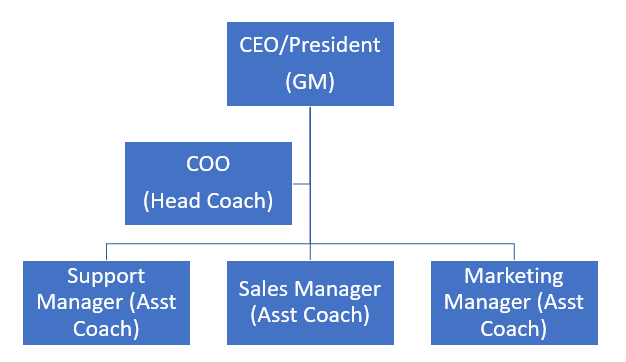Save to My DOJO
Table of contents
This post is part of a series of posts on building an effective managed services team.
How to Build a Successful Managed Services Team – Part 1
How to Build a Successful Managed Services Team – Part 2
For part 3 in our series on building your championship-caliber MSP, we will examine the final component that is needed from a staffing and roster perspective – your ‘coaching’, support and administrative staff. By now you have established your identity and mapped out who you are going to be as an organization. You’ve made your decision on what traits will be the calling cards of your team so that clients will know you and expect what you plan to deliver. You’ve also filled out your roster with the right kind of talent. You’ve established roles (positions) for your team and found the top talent available for those positions. It’s now time for you to have the right people guiding your team and helping navigate the many challenges that are sure to come your way as you enter the topsy-turvy world of providing Managed Services!

Coaches
Keeping with our sports theme, consider what coaches do, even at the elite level. There’s what happens in practice and training, and then there’s what happens on game day. That is to say a coach is teaching and training during the week, and guiding/directing on game day. In much the same way, your MSP coaches need to be teachers as well as directors. Today’s IT workforce is diverse – in almost every way: age, origin, experience/tenure, gender. Your coaches need to be able to relate to all their players and meet them where they’re at so that they can continually teach the processes, techniques, and attitudes needed to win it all. Naturally there are limitations to the sports analogy and those of us in the managed services game know that every day is game day. That means your coaches have to be able to switch into director mode and can ‘call the plays’ to put the team members into positions to be successful. Who are your coaches in an MSP? How about a Support Manager? Perhaps a Sales Manager. In the same way it’s common for coaches to wear multiple hats (Offensive Coordinator and Running Backs Coach) – our MSP coaches often do the same. In our company, it’s not uncommon for even some back-office managers to have some direct revenue responsibility as a VCIO or some other capacity.
GM
Most professional sports teams have a General Manager (GM). They are the ones responsible for assembling the team on the field, the organization behind it and overseeing the whole entity. Correlating that to our MSP, this would be someone who, depending on the size of your organization, could be a COO-type individual that guides the day to day operation. In the scope of this would be ensuring there is an influx of talent (), and that the coaches are developing that talent (they would represent middle-management) as well as deal with upstream concerns. Think about how key individuals in professional sports deal with things like contract negotiations, the media, salary cap management, union concerns – much more “business” related duties. In an MSP it would be no different.
Executive Team, Support Staff, Marketing, Etc
Rounding out the organization, we have the key positions of leadership at the executive or ownership level, as well as support staff and outward facing functions to ensure there is accountability, productivity, and proper branding to the community. In sports, you see this thoroughly as few industries or organizations are marketed more heavily. In an MSP, whether we insource or outsource, having an outbound face to the markets you serve is imperative. Word of mouth is awesome, but only on rare occasions will that form the kind of business development that will sustain your pipeline as you grow. It’s a part, but not the whole. Your support staff is critical. These are often your unsung heroes that ensure that processes are followed, services are billed (and properly!), and even the simple things happen to ensure success. Your positions of leadership must be filled by individuals who can truly lead, but also (in the case of smaller companies) shift into “get it done” mode and manage outcomes. This requires individuals with high emotional intelligence, discipline, and ambition. While those individuals are driving the business and leading the team, it’s the supporting staff positions like Administrative Assistants, Resource Coordinators, Inside Sales Associates that all help make the magic happen and keep the team on the field (think of the beloved Student Manager for the High School basketball team that makes sure the players have water!)
Summary
With fresh memories of an entertaining Super Bowl, it’s only natural to aspire to build an organization that mirrors the consistent excellence of the New England Patriots or one capable of the dynamic performance of the Philadelphia Eagles. In the case of the Patriots, they have appeared in eight Super Bowls in the Bill Bellicheck/Tom Brady era, having won 5. You don’t need a hall-of-fame caliber superstar on your team, to build success and consistently care for your clients. A top-flight Managed Services operation is more about having the right people (personality, strengths/weaknesses, aptitudes, attitudes) in the right places to ensure the whole, is stronger than the sum of its parts. If you are the leader of an organization that is still climbing that championship mountain, follow the blueprint we’re providing in this series to take the steps needed for “playoff contention”!
The advice in this series of articles comes from working with hundreds of individuals across 2 decades in the MSP industry however you’re welcome to disagree with my assessment of the best personalities that comprise an effective MSP. Let me know in the comments below your experiences and thoughts!
Previous entries in this series:
How to Build a Successful Managed Services Team – Part 1
How to Build a Successful Managed Services Team – Part 2


Not a DOJO Member yet?
Join thousands of other IT pros and receive a weekly roundup email with the latest content & updates!







